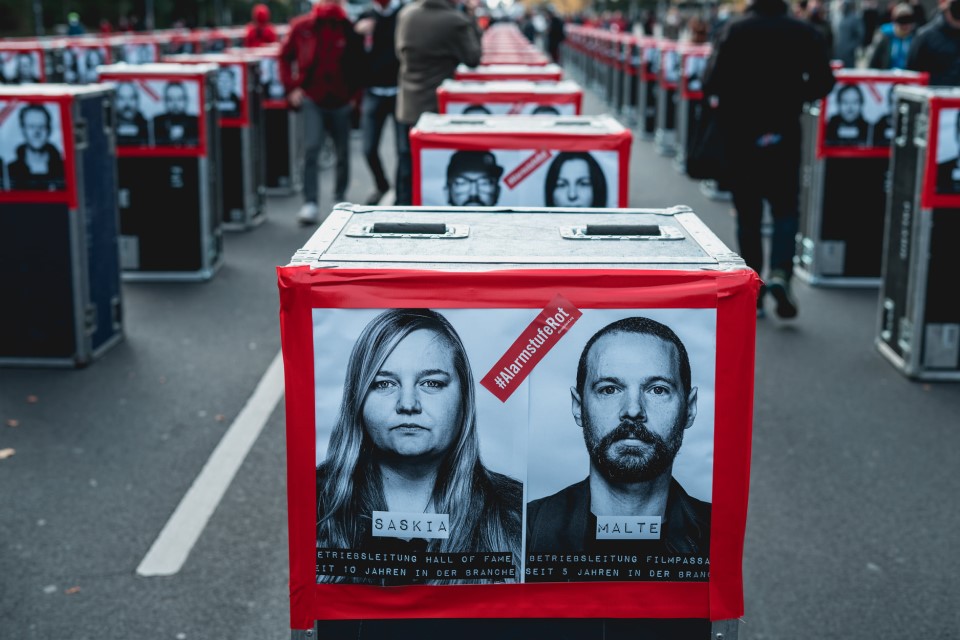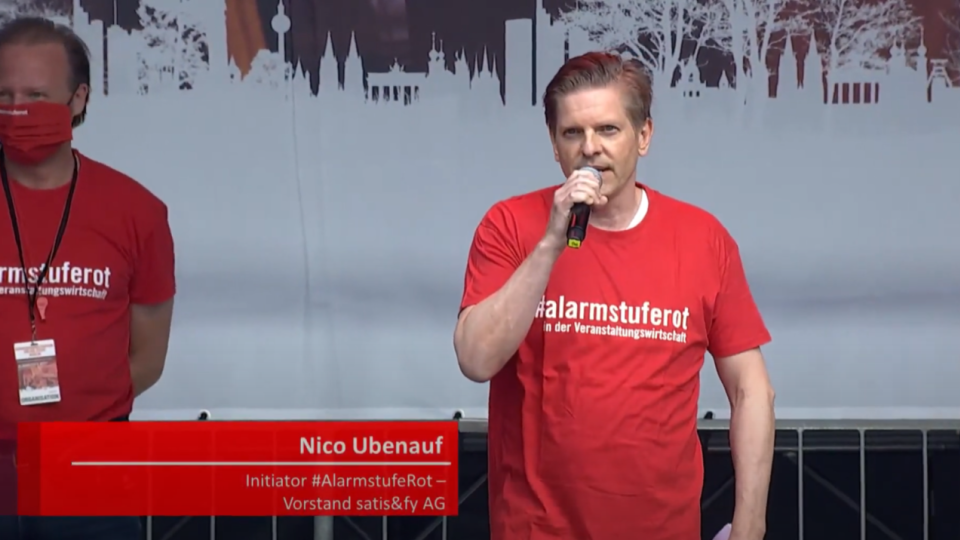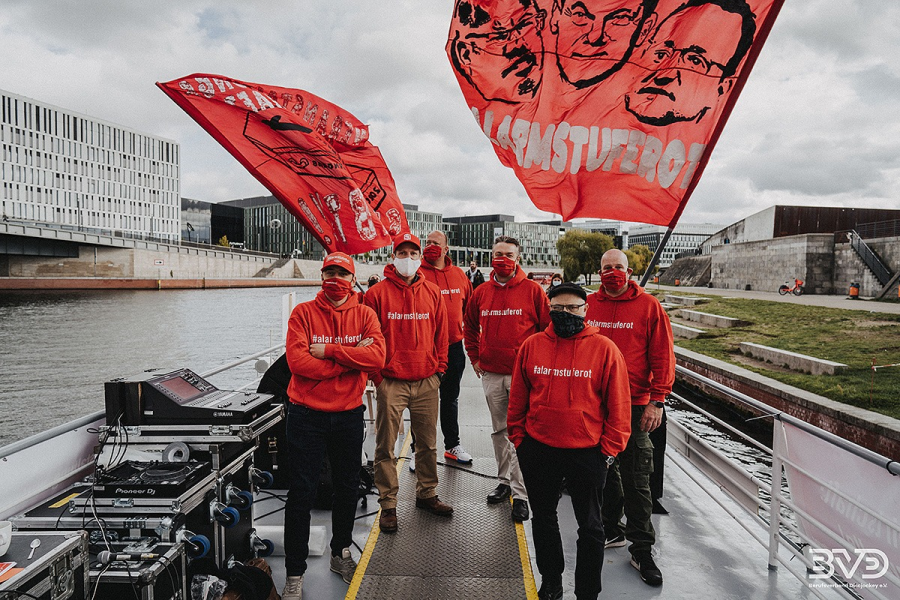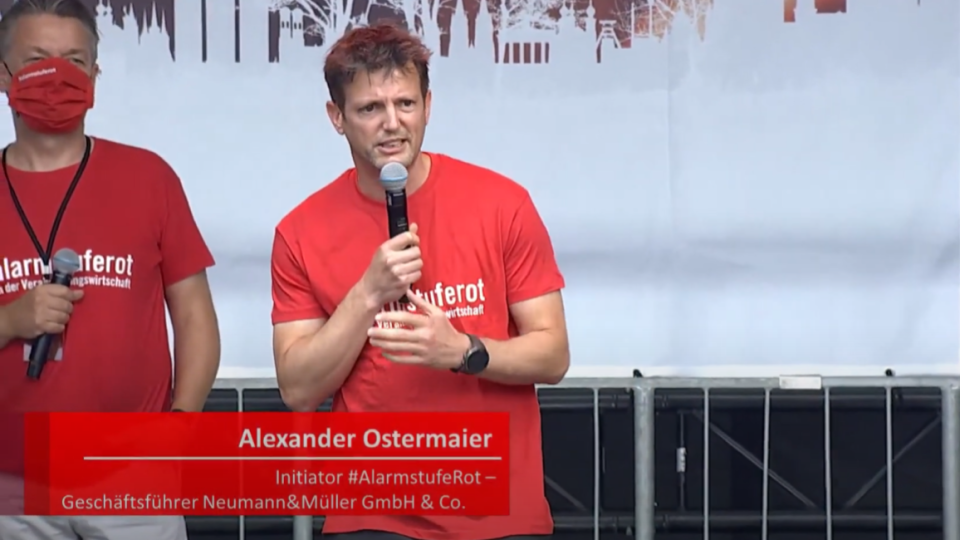Photo: © Ralph Larmann
After eight months of concentrated, almost superhuman effort, representatives of the German event sector have finally scored their first big victory with the inclusion of the event industry in the federal government’s NovemberAid program. The long-awaited decision came not a moment too soon, as it will likely save thousands of struggling event companies and entrepreneurs from going under. For us at AV Alliance, the news of this achievement are especially celebrated, as two of our long-time members, Nico Ubenauf (satis&fy) and Alexander Ostermaier (Neumann&Müller) have been at every stage of the negotiations with the federal government since the very beginning of the pandemic.
Since March, the pandemic has ravaged the event scene in Germany, much like everywhere else in the world, and all players of the industry –technology and equipment rental suppliers, trade show and venue operators, concert organizers, conference producers, caterers and artists, medium-sized companies and self-employed professionals alike – have been struggling to survive. With the public attention focused on the cancellation of concerts and parties due to the coronavirus, it can be easily forgotten (or dare we say, overlooked) that 88% of all the events taking place in Germany are business-related*: trade fairs, tech shows, exhibitions, general meetings, congresses, etc. In comparison, the arts and culture sector only make up for 12% of all events. Due to the lack of concrete actions on the government’s part and without a reprieve over the summer of 2020 under the blanket ban on events, companies chiefly responsible for that 88% were at risk of never recovering from their financial losses.

Faces of a forgotten industry | Photo: © Ralph Larmann
Fighting the good fight
For the past five months we have been following the relentless fight of the German event industry for survival with baited breath, ever since the Night of Light united the sector in an unprecedented way on June 22 (and inspired many other countries to follow suit as part of a global Red Alert campaign). Under the umbrella of the Alarmstufe Rot, an alliance that unites the most influential initiatives – including the Night of Light – and associations in the German event industry, the sector continued its fight for meaningful economic aid with a series of small, regional demonstrations, and two major rallies.
At the first Großdemonstration on September 9 around 15,000 people took to the streets of Berlin to protest the lack of governmental help and consideration that would ensure the survival of the event industry. The second nationwide, large-scale demonstration took place on October 28, where 5,000 participants, including many prominent German artists and entertainers held a march, a car and truck parade, and a rally in solidarity with the entire events sector at the Brandenburg Gate. It is worth mentioning that while the news are filled with anti-Covid protests all over the world, the organizers made sure that all health and safety measures were adhered to, and were quick to emphasize that they did not demonstrate against the government’s coronavirus policies, but for politicians to vote for meaningful financial aid to save a dying industry.
The sacrificial lamb?
No matter the protests and the continuous, intense rescue dialogue between the event industry representatives and the German federal and state governments as well as the opposition, all signs came to point at an impasse: despite assuring the events sector that their plight and sacrifice was understood and appreciated, and that the required funds were available – approximately €1 billion – these subsidies were announced to be granted to other branches of the economy, including the hotel and catering industry.
According to the government’s original plans, the sectors that could apply for financial compensation for revenue loss for the month of November were those that have been directly affected by the recent “Lockdown Light” restrictions across Germany, which included only a small, 12% segment of the event industry, e.g. hotels and catering companies, but largely excluded every other industry player that has seen its business event services mauled by the pandemic.
Novemberhilfe (NovemberAid) is a governmental financial aid program that originally set out to partially cover the loss of revenue for the month of November due to the so-called “Lockdown Light” measures across Germany. The aid pays out 75% of a company’s expected November 2020 revenues, with reported earnings of November 2019 as a reference point.
In their corresponding – and understandably fiery – press release, representatives of the Alarmstufe Rot initiative pointed out that while the eligible industries – especially those in the public eye, such as theaters, cinemas and restaurants – were struck just as hard by the coronavirus pandemic, they already had the possibility to make up for lost revenues over the summer months, while the event industry had been without income since March and was to be left out of the Novemberhilfe program. The claim that such an action would have proven to be “the death sentence that the government has pronounced on the German event industry” is, sadly, not an exaggeration.
“It is currently being evaluated which industries are worth saving and which Germany apparently doesn’t need anymore”, they said, slamming the unrealistic application criteria and the blatant overlooking of the immense number of “invisible suppliers and service providers in the event industry drowning under the surface”.

Over the course of the past eight months Nico Ubenauf, CEO of our long-time AV Alliance member satis&fy, and one of the co-initiators of the Alarmstufe Rot campaing has played a significant and active part in the struggle to save the event industry. In response to the original draft of the Novemberhilfe program, he did not mince his words when criticizing the Government’s decision power over which sectors are worth saving in their opinion and which can be left to die:
“The Federal Government is only helping those industries which it considers worth saving. The rest of the industries have been left to perish as it does not meet the Government’s long list of criteria. This notwithstanding the fact that the event industry is the sixth largest in Germany and constitutes a major chunk of the economic pie with over 100,000 companies and over a million employees. It is way ahead of the automobile industry. The Federal Government is trumpeting its bailout package just to grab media’s attention and make headlines. They are not genuinely interested in the welfare of the German people per se. These bailout packages are just for the pressers and to make headlines, in reality the industries which are in dire straits have been left to their own devices.”
A sigh of relief
After many late nights of coordination, and continuous dialogue with the federal government, representatives of the Alarmstufe Rot alliance managed to prevent the event industry from being largely excluded from the much-protested original framework of the Novemberhilfe program that was met with outrage and despair from the events sector.
Thanks to the current framework, around 100,000 companies and 1 million employees in the German event industry can finally breathe a sigh of relief, as for the first time since the coronavirus crisis began in March, sales compensation (75% of the reported revenue of November 2019) is for the companies and self-employed professionals who have been hit the hardest is now granted.
While previously a staggering 88 % of the industry was to be excluded from the program due to a loophole, thanks to the relentless appeals of the events sector this restriction has now been eliminated. This means that not only event organizers who have been directly affected by the recent partial lockdowns across Germany can apply for financial aid, but also those event suppliers who are indirectly impacted due to revenue shortfalls and cancellations. The new basis of application for funding within the Novemberhilfe is that companies and self-employed professionals must have previously made 80% of their sales in the event industry.
After months of no sales, revenues, or any kind of financial aid, the federal government’s extension gives the kind of hope to the events sector it has been desperately hoping for. The fight, however, is not over, as pandemic-related restrictions will likely impact the industry’s operations until June 2021. The Alarmstufe Rot alliance’s aim is now to secure the government’s help for a bridging program that would help rebuild the sector’s capacities for the time that business truly reopens.

Before the jump | Photo: © Berufsverband Discjockey e.V. (BVD)
Alexander Ostermaier, CEO of Neumann&Müller Veranstaltungstechnik is also among the Alarmstufe Rot crusaders who have been fighting tooth and nail for government aid for the industry, and he has also personally taken part in some of the guerrilla activities of the campaign – even jumped into a freezing river for the good cause. We figuratively sat down with Alex to personally ask him the most important questions that have been on our minds for a long time.
AVA: You were one of the initiators of the Jetzt-Sonst.de campaign, one of the first industry responses to the coronavirus crisis that eventually became part of the Alarmstufe Rot campaign. What was the main message of that initiative?
AO: “We addressed an open letter to Chancellor Merkel in March, stating that the event industry urgently needs help. It quickly became clear to us that our industry would be one of the first and most severely affected industries and would most likely have the longest lasting exposure to the pandemic’s effects. So, we coined the phrase “first in – last out” that is still used regularly today in the media to describe the situation. Our goal was to raise awareness and establish a direct dialogue with political decision-makers.”
AVA: In your opinion how did the Night of Light impact the course of the fight for the survival of the German event industry, and what made it different from similar initiatives in other countries (e.g. WeMakeEvents, etc.)?
AO: “I think the Night of Light was so successful because Tom Koperek, the initiator of the event, put an incredible amount of energy into networking the entire event community. On June 22 this resulted in about 8,000 companies illuminating more than 9,000 buildings in Germany in red. For the first time, this drive got a nationwide echo in the media, which could not be overlooked even by the federal government.”
AVA: In the past 8 months, what kind of reaction did you get from the public to the different stages of the campaign, if any?
AO: “The reactions to the #AlarmStufeRot campaign are mostly positive. In the meantime, we are experiencing great support from many celebrity artists in Germany and the media also report almost daily about the hardships of the event industry. Considering that we started as a grassroots movement only 8 months ago, this is already a great success.”
Alex Ostermaier (Neumann&Müller) and Christian Eichenberger (Party Rent Group) symbolically go under(water) for the entire industry in Berlin’s Spree river in early October 2020
AVA: A staggering 88% of all German events come from the business sector, such as trade shows, meetings, conferences etc., and only 12% of them are cultural and social events. For Neumann&Müller, how did that ratio look like back in February, and based on that how seriously did the pandemic affect your business?
AO: “We have pretty much the same ratio. With the beginning of the pandemic back in March, our turnover dropped by about 90%. There was a slight recovery in September and October, but we are still far behind our regular business. In the end, we await a turnover loss of about 65 – 70% for 2020. Without support in the form of a government loan and the possibility to send employees on short-time work, we would certainly not have survived.”
AVA: What has been the greatest obstacle in getting concrete actions from the government, such as the event industry’s inclusion in the NovemberAid (Novemberhilfe) program?
AO: “The biggest challenge was that at the start of the movement we had zero contact with political decision-makers. Besides, the entire industry was completely unknown to the government. There were no studies whatsoever on the overall economic significance of the event industry. Due to all this, we had to start from scratch and the pressure of the time constraint was immense. To give you just one example out of many, in the first draft of the NovemberAid program only those companies directly affected by the lockdown regulations would have been eligible to apply. However, the majority of companies in the sector are only indirectly affected by those and would thus have fallen through the grid again.”
AVA: What does this recent victory mean for your own company?
AO: “I can’t tell you exactly yet. At best, we meet all the necessary criteria of the NovemberAid regulations and can thus claim up to 75% of our November 2019 revenues as a kind of compensation for November 2020.”

AVA: The fight is not over yet – what are the next steps, and what are you personally still looking forward to achieving?
AO: “Since the pandemic affected our industry for more than 8 months now and will presumably not be over until summer 2021, there are many more steps to come. Next will be the negotiations on the so-called Überbrückunsghilfe Phase III (bridging aid) which is planned to be available from January to June 2021. In this program, too, we must make adjustments to ensure that the companies in our industry are given sufficient consideration. My personal goal is still to get money from one of these programs into the bank account of our company. This has not yet happened.”
AVA: The German event industry was the first to react to the crisis as a united front (thus inspiring others on a global scale), and the first to see the fruit of its tireless efforts. Do you think this first win could spur others on to keep fighting or spark a global trend in government actions?
AO: “I would very much like this spark to fly. In Europe, there is now a good exchange on the various government programs from the association level, since all member states of the EU must coordinate their economic aid with the EU Commission, there is at least one central point where everyone meets.”
“What we all have to learn is that if we want to be noticed by governments, we have to get out of our comfort zone and step into the spotlight to stand up for our interests. This is something our industry has certainly done far too seldom in recent decades.”

